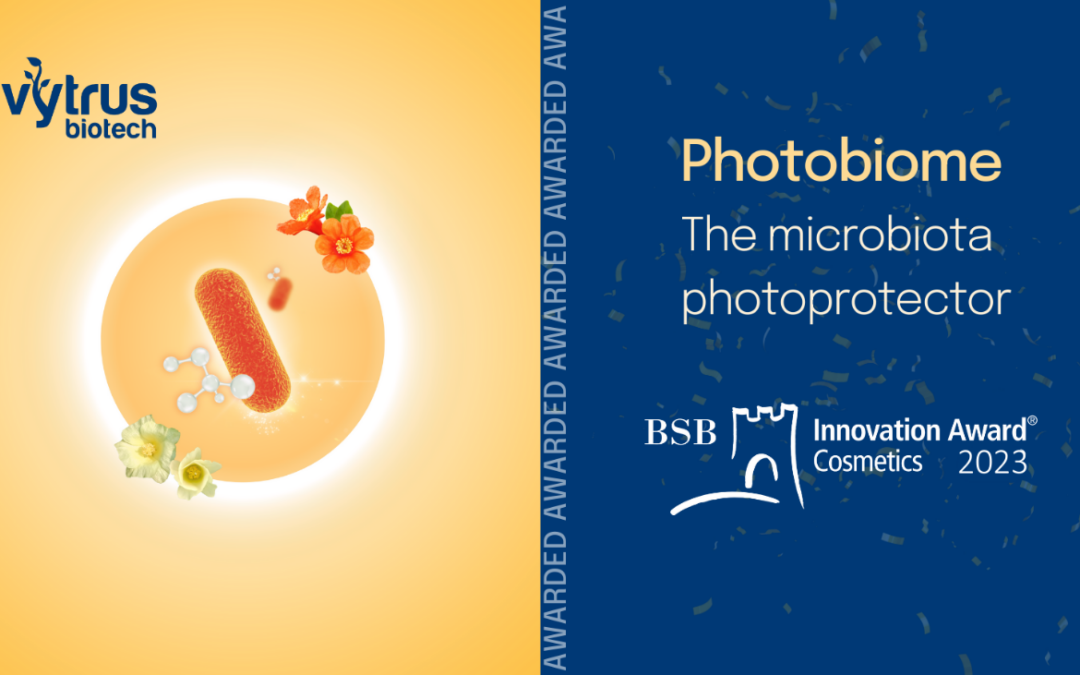Barcelona, 28th March 2023
Vytrus Biotech, the company specialized in active ingredients derived from plant stem cells for the cosmetic industry, has received the prize in 2023 BSB Innovation Awards for its natural active PHOTOBIOME – the microbiota photoprotector.
The active ingredient has been ranked on the 1st position in the BSB Innovation Awards in the 2023 edition in the category of Raw Materials. An award that recognizes the biotech active for its creative approach due to its biophysical mechanism of action based on a plant strategy.
Photobiome opens the door to a new category of Microbial Antioxidants by helping our skin microbiota photoprotect itself by protecting and nourishing bacteria, modulating the release of its own natural photo-defense molecules that improves the signs of the photoageing process on the skin.
The Photobiome Factor: a new key player in the skin photoageing
The biotechnology company introduces a new cosmetic concept, the Photobiome Factor: the specific microbial community that has a special relation with solar radiation and its metabolic behaviour, impacting on our skin. These microorganisms can interact with sun radiation and produce specific metabolites: the solar postbiotics.
Among these solar postbiotics, microbial melanin and urolithins stand out. Both compounds photo-protect the skin microbiota and are part of the skin’s natural photo-defense system. If the conditions are not favorable – like with an excessive sun exposure – the population of these protecting microbes is dramatically reduced, the production of urolithins and melanin is decreased, and the cutaneous synthesis of harmful metabolites gets higher, worsening the skin photo-induced damage and photo-ageing.
The new active Photobiome modulates bacteria metabolism and stimulates them to produce photo-defense molecules that are beneficial for the skin cells. The active counteract and protect the microbiota and the skin cells from the photo-oxidative stress of the harmful sun radiation.
The new Sun-Microbiota-Skin axis
Vytrus has been researching in the microbiota field for 10 years, starting from the discovery of respectfully ‘hacking’ bacterial communication through ‘Quorum Sensing’ molecules produced by Noni cell cultures. This led to the first launch of products with the ability to inhibit bacterial virulence: Quora Noni™ to treat acne-prone skin and Deobiome Noni™ to regulate body odor as a biological deodorant. Then, Vytrus discovered the relevance of the Microbiota-Skin-Brain axis, demonstrating with Kannabia Sense™ the ability of microorganisms to influence the regulation of skin hormones, such as oxytocin, and their impact on emotional well-being. In recent years, Vytrus has focused on the influence of the microbiota on the ageing process, and as a result of this development Quora Noni™ biomics has shown that the skin can be rejuvenated by rejuvenating the skin microbiota by balancing the “Senile Biome Markers”.
Now Vytrus unveils with Photobiome its latest scientific advances in the microbiota field and describes a new biological approach: the Sun-Microbiota-Skin axis, elucidating the important role of the microbiota in relation to the effects of solar radiation on the skin, either in favor or to the detriment of the skin tissue. The active combats the skin photo-ageing from excessive sun exposure by photoprotecting the skin microbiota.
The story of an innovation inspired by nature
Photobiome is a 100% natural active ingredient from stem cells of pomegranate (Punica granatum) and cotton from desertic and semi-arid regions of the Near and the Middle East (Gossypium herbaceum). Through a new technological platform of Phyto-Cell Fusions, Vytrus combines a Phyto-Lipidic Fraction (PLF) of P. granatum with a Plasma Rich in Cell Factors (PRCF) of G. herbaceum. This way, Vytrus obtains a synergistic effect of prevention from photo-ageing by photoprotecting the skin microbiota.
Crossing frontiers in sun care and well-ageing through biotechnology
Photobiome involves a new paradigm in the suncare and well-ageing markets and a step forward and a scientific discovery in the microbiota field. This new category of biotechnology-based active ingredients offers cosmetic formulations new pathways to protect and repair skin photodamage with a sustainable solution based on plant biotechnology:
• Preventive & treating antioxidant formulations
• Tackling photoageing – products to take care of wrinkles (crow’s feet area, bar code, eye contour)
• Preventive & reparative suncare formulations
• Treatments to improve the appearance of hyperpigmentation

